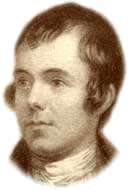THE PEASANT POET- ROBERT BURNS-
VOCABULARY, TONE, SYMBOL

|
Should auld acquaintance be
forgot, / And never brought to mind? / Should auld acquaintance be forgot, /
And days o’ lang syne? |
|
—Auld Lang Syne by Robert
Burns |
|
Robert |
UNIT OVERVIEW: The poetry of the 18th century as previously discussed had its emphasis on elegance, style and a refined manner. One poet of the time, however, caused much discussion. Robert Burns was a farmer’s son and a farmer himself. His poetry reflected the more rustic side of life. He used this knowledge to develop his poetry, thus giving him the nickname as “The Peasant Poet.”
![]() Now answer
questions 1-4
Now answer
questions 1-4
Now let’s read…
“To A Mouse”
WEE, sleekit,
cow’rin, tim’rous beastie,
O, what a panic’s
in thy breastie!
Thou need na start
awa sae hasty,
Wi’ bickering
brattle!
I wad be laith to
rin an’ chase thee,
5
Wi’ murd’ring pattle!
I’m truly sorry
man’s dominion,
Has broken
nature’s social union,
An’ justifies that
ill opinion,
Which makes thee startle 10
At me, thy poor,
earth-born companion,
An’ fellow-mortal!
I doubt na,
whiles, but thou may thieve;
What then? poor
beastie, thou maun live!
A daimen icker in a thrave 15
’S a sma’ request;
I’ll get a blessin
wi’ the lave,
An’ never miss’t!
Thy wee bit
housie, too, in ruin!
It’s silly wa’s the win’s are
strewin! 20
An’ naething, now,
to big a new ane,
O’ foggage green!
An’ bleak
December’s winds ensuin,
Baith snell an’
keen!
Thou saw the fields laid
bare an’ waste,
25
An’ weary winter
comin fast,
An’ cozie here,
beneath the blast,
Thou thought to
dwell—
Till crash! the
cruel coulter past
Out thro’ thy
cell.
30
That wee bit heap
o’ leaves an’ stibble,
Has cost thee mony
a weary nibble!
Now thou’s turn’d
out, for a’ thy trouble,
But house or hald,
To thole the winter’s sleety
dribble, 35
An’ cranreuch
cauld!
But, Mousie, thou
art no thy lane,
In proving
foresight may be vain;
The best-laid
schemes o’ mice an’ men
Gang aft
agley,
40
An’lea’e us nought
but grief an’ pain,
For promis’d joy!
Still thou art
blest, compar’d wi’ me
The present only
toucheth thee:
But, Och! I backward cast my
e’e. 45
On prospects
drear!
An’ forward, tho’
I canna see,
I guess an’ fear!
![]() Now
answer questions 5-7
Now
answer questions 5-7
In addition to producing “rustic” poetry, Burns also has been considered a
pre-Romantic poet. Scholars believe this because his sentiment is revealed in
his poetry. One such poem of this type is “A Red, Red Rose.”
A
Red, Red Rose

|
O MY Luve’s like a red, red rose, |
|
That’s newly sprung in June: |
|
O my Luve’s like the melodie, |
|
That’s sweetly play’d in tune. |
|
|
|
As fair art thou, my bonie lass, |
|
So deep in luve am I; |
|
And I will luve thee still, my dear, |
|
Till a’ the seas gang dry. |
|
|
|
Till a’ the seas gang dry, my dear, |
|
And the rocks melt wi’ the sun; |
|
And I will luve thee still, my dear, |
|
While the sands o’ life shall run. |
|
|
|
And fare-thee-weel, my only Luve! |
|
And fare-thee-weel, a while! |
|
And I will come again, my Luve, |
|
Tho’ ’twere ten thousand mile! |
|
|
![]() Now answer questions 8-11
Now answer questions 8-11